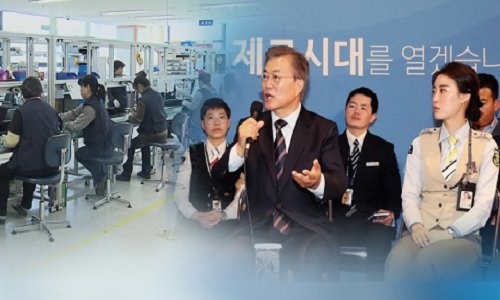The success of President Moon Jae-in’s economic policy to promote income-led growth will eventually hinge on whether and how to nurture more competitive and profitable small and medium-sized enterprises, economists say.
More contributions by SMEs will be essential to creating quality jobs and boosting growth potential -- key tasks for the Moon administration.

SMEs account for about 99 percent of corporations operating across the country, hiring nearly 90 percent of waged workers.
Moon has vowed to strengthen support for small businesses, planning to upgrade the government entity handling SME-related affairs, which has been under the Ministry of Trade, Industry and Energy, to an independent ministerial-level office.
But his administration’s push to increase the minimum wage, reduce working hours and turn nonregular jobs into regular ones at a steep pace has worried many SMEs that have been struggling to stay afloat.
Small business operators are also skeptical about the effect of a program to be funded by the extra budget unveiled last week, which entitles SMEs to receive up to 20 million won ($17,700) in wages for a third employee for every two workers they hire.
“It is doubtful that there will be a change in young job seekers’ negative attitude toward working at SMEs,” said an owner of a small manufacturing firm, adding that the wage gap with large corporations could be narrowed significantly and sustainably only when small businesses grow more competitive and profitable.

Experts say efforts should be stepped up to increase exports by small and midsized firms, most of which rely on slumping domestic demand and remain as parts suppliers for larger manufacturers.
Excessive competition among small companies undermines the efficiency of the whole national economy.
“It would be difficult to create a meaningful number of quality jobs without boosting exports by SMEs as large manufacturing exporters have globalized their production to a considerable extent,” said Ko Dae-jin, head of the IBK Economic Research Institute.
Increasing exports by small businesses is also crucial to overcoming rising global protectionism.
According to a survey of about 720 exporters and foreign importers of Korean products, conducted by the Korea Trade-Investment Promotion Agency in January, the country’s shipments abroad were projected to grow 3.4 percent on-year to $512.5 billion this year on the back of a recovery in advanced economies and big emerging markets.
But some experts caution that external conditions for Korean exporters may be tougher in the year, as US President Donald Trump carries out his protectionist policies and China maintains retaliatory steps against Seoul for its hosting of an advanced US anti-missile system.
What is needed to overcome this unfavorable circumstance is to induce more SMEs to ship their goods to more diversified markets overseas, they say.
Small firms’ proportion of Korea’s exports has remained below 20 percent over the past years, with their overseas shipments amounting to $92.9 billion, or 19.8 percent of the total, in 2016.
Less than 1 in 10 local SMEs have a record of shipping their goods abroad, according to data from the Small and Medium Business Administration. The amount of exports hovers below $100,000 for 40 percent of SME exporters.
Figures from the Korea International Trade Association show only 2.6 percent of the country’s small businesses are engaged in exporting, with the corresponding figures standing at 5.2 percent in the US, 9.7 percent in Germany and 10 percent in Canada.
“It is necessary to strengthen policy support for SME exporters so that they can take the lead in increasing exports by new industries,” said Kim Jung-kwan, vice chairman of the KITA.
Sluggish exports by small and midsized firms is attributable partly to the government focusing support on the development and production of goods rather than overseas marketing and sales.
More than 40 percent of export deals signed by local SMEs with foreign buyers are one-off agreements, industrial officials say.
At the outset of this year, the SMBA, which will be incorporated into the new ministerial-level entity, announced measures to nurture more SME exporters and help existing exporters continue to increase shipments abroad. They included guiding foreign tourists to purchase products made by small firms at local traditional markets and providing more useful information on overseas markets by setting up more business centers in Southeast Asian and Latin American nations.
Experts also note local SMEs, especially makers of cosmetics and other consumer goods, are in a position to find greater opportunities for increasing sales abroad through global online markets, which are projected to expand from $304 billion in 2015 to $1 trillion by 2020.
Korea’s exports through e-commerce sites stood at about $100 million in 2015, accounting for less than 0.03 percent of the country’s overall outbound shipments.
The planned ministry, which is expected to be launched next month if a government reorganization plan is approved by lawmakers during the ongoing parliamentary session, will be certainly in a better position to work out comprehensive measures to support SMEs.
But experts still express doubt that it would be much instrumental in boosting SME exports as many related organizations handling large sums of funds are set to stay outside it.
By Kim Kyung-ho (khkim@heraldcorp.com)
-
Articles by Korea Herald







![[KH Explains] How should Korea adjust its trade defenses against Chinese EVs?](http://res.heraldm.com/phpwas/restmb_idxmake.php?idx=644&simg=/content/image/2024/04/15/20240415050562_0.jpg&u=20240415144419)












![[Today’s K-pop] Stray Kids to return soon: report](http://res.heraldm.com/phpwas/restmb_idxmake.php?idx=642&simg=/content/image/2024/04/16/20240416050713_0.jpg&u=)